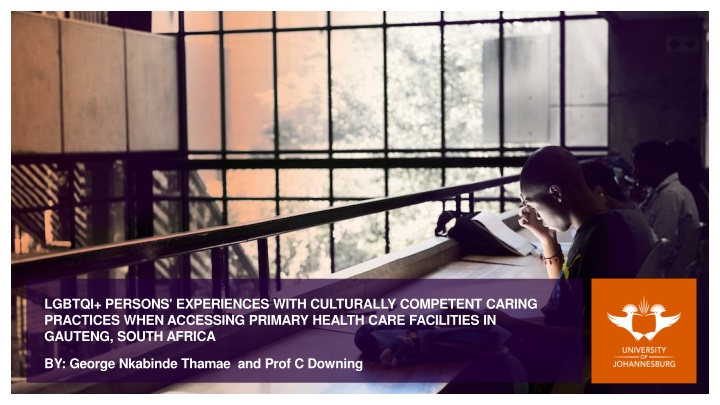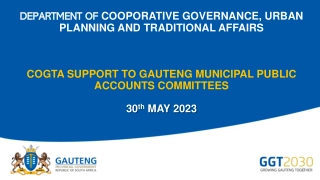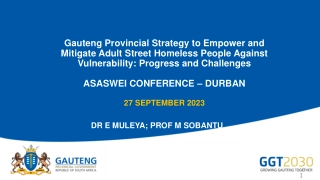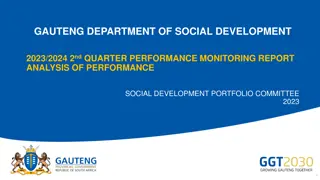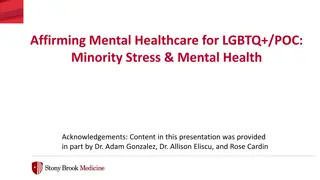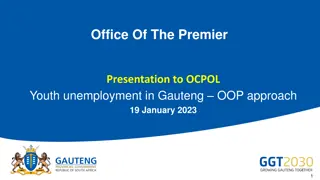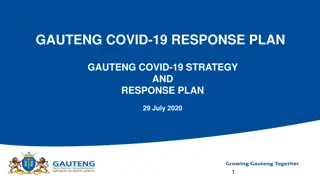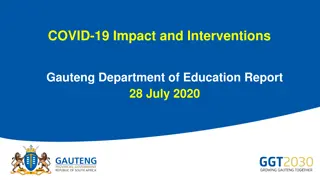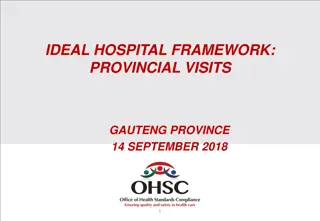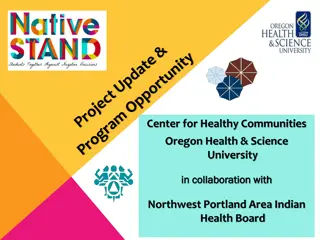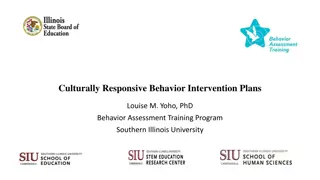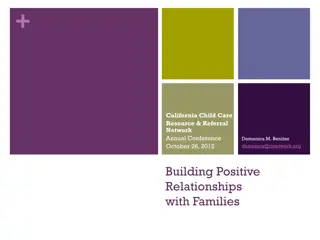Culturally Competent Healthcare for LGBTQI+ Individuals in Gauteng
This research addresses the lack of culturally competent healthcare services for LGBTQI+ individuals in South Africa, focusing on experiences at primary healthcare facilities in Gauteng. The aim is to develop strategies for healthcare professionals to provide effective care for LGBTQI+ patients. The study aims to understand the barriers faced by the community and improve access to quality healthcare.
Download Presentation

Please find below an Image/Link to download the presentation.
The content on the website is provided AS IS for your information and personal use only. It may not be sold, licensed, or shared on other websites without obtaining consent from the author.If you encounter any issues during the download, it is possible that the publisher has removed the file from their server.
You are allowed to download the files provided on this website for personal or commercial use, subject to the condition that they are used lawfully. All files are the property of their respective owners.
The content on the website is provided AS IS for your information and personal use only. It may not be sold, licensed, or shared on other websites without obtaining consent from the author.
E N D
Presentation Transcript
LGBTQI+ PERSONS' EXPERIENCES WITH CULTURALLY COMPETENT CARING PRACTICES WHEN ACCESSING PRIMARY HEALTH CARE FACILITIES IN GAUTENG, SOUTH AFRICA BY: George Nkabinde Thamae and Prof C Downing
BACKGROUND Literature provides evidence that culturally competent healthcare services are offered to people classified as heterosexuals; however, the same cannot be said for those who are classified as lesbian, gay, bisexual, transgender, queer, and intersex (LGBTQI+). This phenomenon seems applicable in South Africa and other countries like Russia, Canada, Italy, and India. Various studies have been conducted on LGBTQI+ individuals. However, there appear to be minimal studies on culturally competent caring practices, especially within a Primary healthcare setting. Creating and sustaining culturally competent systems of caring will diminish barriers and empower healthcare practitioners on LGBTQI+ individual health disparities to promote quality of health amongst LGBTQI+ people. #JoburgResearch 2024: Enhancing PHC service delivery outcomes through research. 2
KEY CONCEPTS 1 2 Culturally competence Culturally competence The ability of an individual to provide healthcare services, that accommodate the patient s sociocultural and linguistic needs to reduce health disparities (Smith, Purcell, & Charles, 2022:1-7) Culturally competence is recognized as an imperative aspect equitable service delivery to reduce health disparities and promote the improvement of access to quality services,(Lau, & Rodgers, 2021:123-128). of effective and #JoburgResearch 2024: Enhancing PHC service delivery outcomes through research 3
RESEARCH AIM AIM 1 The research aims to understand LGBTQI + patients experiences of culturally competent care when accessing Primary Healthcare Facilities in Gauteng South Africa, to develop, validate, and implement strategies to enable PHC professional nurses to facilitate effective culturally competent care for LGBTQI+ patients. #JoburgResearch 2024: Enhancing PHC service delivery outcomes through research 4
PROBLEM STATEMENT On a personal and professional level, has the researcher been asked by individual members of the LGBTQI+ community if he knows a private medical practitioner in Gauteng who provides healthcare interventions? In support of this view, Damaskos, Amaya, Gordon, and Walters (2018:34-36) concur that LGBTQI+ people mistrust and fear the healthcare system, which can only improve if nurses practice culturally sensitive care and treat the individual, irrespective of their sexual orientation. #JoburgResearch 2024: Enhancing PHC service delivery outcomes through research 5
RESEARCH METHODOLOGY QUALITATIVE RESEARCH 1 2 POPULATION & SAMPLING Phenomenology Descriptive Explorative LGBTQI+ patients who have used a PHC clinic in Gauteng in the last six months on more than one occasion DATA COLLECTION: unstructured individual interviews 3 Sixteen (16) unstructured individual interviews were conducted from 9/9 provinces. One Central Question What are your experiences with the care you receive when visiting healthcare facilities? #JoburgResearch 2024: Enhancing PHC service delivery outcomes through research 6
DATA ANALYSIS & FINDINGS The researchers used the six phases of reflexive thematic analysis as stipulated by Braun and Clarke. PATIENTS WHO ARE CLASSIFIED AS LGBTQI+ PERSONS ARE NOT RECEIVING CULTURALLY COMPETENT CARE WITHIN PRIMARY HEALTHCARE FACILITIES Add title #JoburgResearch 2024: Enhancing PHC service delivery outcomes through research 7
VERBATIM QUOTES Silence . Moving in a chair) My experiences, I would say, were uncaring as I was treated differently from the guys . Or should I rather say, human beings, which made my experience terrible. (# Participant 2, Self-Classification Gay) It's professional care. I'm not sure that should be given to any patient who walks into the clinic regardless of their sexual orientation because that is also a violation of my human rights, which is in the Bill of Rights in the constitution. I'm being discriminated against because of my sexual orientation, which is there in the Constitution. More significantly, for a public health facility, they should be able to assist anyone that walks in, and yeah, one then feels disrespected, or there's a lack of respect for different or certain types of groupings that walk into the clinics . (# Participant 3, Self- Classification: Gay) If nurses at local clinics could have practical communication skills and not judge me as a lesbian, it would certainly prevent a lot of humiliation, feelings of embarrassment, and homophobic encounters. Nurse hardly listens to us; they give all the instructions and ask all the questions, and they still have stereotypical beliefs that if you are a masculine female, you are lesbian. If you are feminine, you are straight (Normal), that s not the case, but nurses are so arrogant and focused on irrelevant aspects of the LGBTQ+ community or individuals from the LGBTQI+ community that they forget to prioritize our health needs . (# Participant 11, Self-Classification: Lesbian) #JoburgResearch 2024: Enhancing PHC service delivery outcomes through research 8
FINDINGS OF THE STUDY Theme 1: Uncaring moments when visiting primary healthcare facilities. The participants experienced inappropriate use of words when accessing healthcare facilities. The participants experienced discrimination from staff members at primary healthcare facilities The participants expressed difficulty and fear in communicating their healthcare needs to professional nurses. #JoburgResearch 2024: Enhancing PHC service delivery outcomes through research 9
FINDINGS CONTINUED. Theme: 2 The participants link the care they received at primary healthcare facilities to social injustice The participants experienced no inclusive care when accessing a primary healthcare facility. The participants expressed that individualized- centered care was absent. The participants said they would instead access private healthcare institutions for healthcare services but deemed it expensive #JoburgResearch 2024: Enhancing PHC service delivery outcomes through research 10
FINDINGS CONTINUED . Theme 3 : professional nurses are (un) prepared to provide care to LGBTQI+ persons Professional nurses don t have adequate knowledge, skills, and values regarding the healthcare services they need. Lack of humanity when accessing a primary healthcare facility. Lack of Ubuntu from the professional nurses when accessing primary healthcare facilities. #JoburgResearch 2024: Enhancing PHC service delivery outcomes through research 11
TENTATIVE RECOMMENDATIONS Curriculum LGBTQI+ content Self Reflection-Recognise Own biasness, cultural beliefs, values, and practices Infrastructure Safety, Unisex toilets Welcoming Environment: LGBTQI+ friendly material Documentation: Her, Him, Mr, Mrs Respect: Individual, Person, Pronounce #JoburgResearch 2024: Enhancing PHC service delivery outcomes through research 12
CONCLUSION & RECOMMENDATIONS 1 CONCLUSION The study unveils the challenges LGBTQI+ persons experience when accessing Primary Healthcare facilities in Gauteng South Africa. 2 RECOMMENDATIONS Strategies still need to be developed and validated. However, the researchers hope that the findings of this study will attempt to promote inclusive healthcare services for LGBTQI+ persons. #JoburgResearch 2024: Enhancing PHC service delivery outcomes through research 13
ACKNOWLEDGEMENT Research supervisors: Professor Charlene Downing University of Johannesburg Nursing Science Department University of Johannesburg supervisor linked Bursary and Merit for financial assistance 2023/2024 #JoburgResearch 2024: Enhancing PHC service delivery outcomes through research 14
